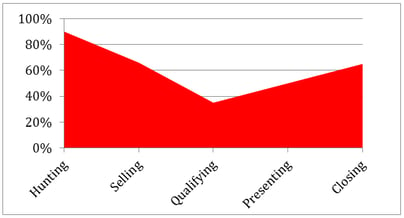In January, we launched Hire Better Salespeople. It is the recruiting business solution to help companies profile, attract, screen, evaluate, hire and on –board “A” sales talent. We specialize in financial services, banking and insurance. There are actually three differentiators in our approach, but now I only want to talk about one of the three – Onboarding.
Here are a couple of things to recognize before we get into onboarding:
- Your current recruiting process/system today is perfectly designed for the results you are getting today and will get tomorrow.
- Assuming you have more than 10 salespeople, the Pareto Principle is probably alive and kicking in your organization. If you double click on the 80/20 rule, you will most likely discover that about 40% of your team is responsible for 90% of your revenue.
- Assuming you have 10 people and the 80/20 rule applies to your organization, you have 6 people responsible for less than 10% of your revenue.
- If we switch from the 80/20 principle to thinking about a traditional bell curve, you have a large segment of your production team in the fat part of the bell curve. Most likely, those people in the middle standard deviations and those on the extreme left are probably not hitting their production goals.
I have a question about the people who are not hitting goals or are not performing as you thought they would when you hired them. Did you hire them that way or make them that way?
If you’ve been following me for any length of time, you’ve probably read that question before. If you’ve heard me speak or if you are part of our Sales Management Certification program, you’ve heard me ask that question. It is a question that must be answered because the people that are on your team are your people. I would venture to guess that you didn’t seek approval to hire someone to be average. You probably expected them to excel. So, what happened?
My final assumption (which I really shouldn’t do) is that you hired someone that should be successful, but something happened. Let’s assume those that are not performing were not bad hires. What happened?
Poor onboarding.
In our Hire Better Salespeople program, we “close out” each hiring project with an intensive onboarding process. We assume that the hiring company will execute its own company onboarding process, but that normally doesn’t address some specific needs. Our system is designed to help the newly hired sales person to get up to speed quickly so that their ramp up time to success is as short as possible. A solid “sales” onboarding program has several components.
Here are just a few to-do items that we recommend to our clients or execute ourselves as part of the new hire onboarding. (This list consist of items normally not covered in typical company onboarding)
- Competitive information training
- Company ideology, mission and vision
- Sales training (especially when more senior salespeople are hired. There is an assumption that, because they are senior, they don’t need additional training or coaching)
- Accountability processes that will take place
- Review contact list
- Joint calling schedule
- Goals and business plan development
- Sales and activity tracking system and process
- Expectations for results, compliance and execution of sales tools
- Appointment debriefing process
Adding to the onboarding list of to-dos is a list of questions that the hiring manager or sales manager must be able to answer for the new hire. (Partial list)
- What are all of the problems we solve?
- Why are we better?
- What is our brand promise?
- How do we position ourselves in the marketplace?
- Who are our customers?
- How do we get to them?
- Why will they see me?
- What does the first call sound like?
- What is our sales process?
- What are the questions I should be asking?
Not only does a company have to execute these two examples, they must also address THE VERY important data acquired during the recruiting process. That data is the information gained from initial phone contact interview, the pre-hire assessment data and the information gained about the candidate in the resume review and the interviewing process.
Recognize that no matter how good this candidate appears to be, all candidates come with some warts. No one, I repeat, no one is perfect. The problem with dealing with weaknesses occurs because typically the hiring manager is so thrilled with getting the position hired they just want to get the person in the chair, on the phone and in the market. There is given little, if any, recognition that the person had some sales weaknesses, practice management challenges and/or maybe some technical problems to overcome.
Take a look at this quick snap shot of a small portion of the information provided about a candidate that completes the OMG pre-hire assessment tool (click this link and complete registration form to receive a complementary pre-hire assessment evaluation to use on a current candidate)we use for all our recruiting:

This particular candidate has several areas where work is needed. Even if this candidate is determined to be hirable and a great fit for your organization, you are hiring someone that also has sales skill deficits in qualifying, presenting and closing. You MUST have, as part of your onboarding, a sales development partner that addresses these specific areas or else the results you think you are hiring may not show up for a long time… or maybe not at all!
If you are going to spend resources - time, money and effort - recruiting top talent, then take the time to onboard them correctly.
Here are some links to additional information and resources.
- FREE WEBINAR - Do you need stronger salespeople to meet current selling challenges? If you answered yes, then this webinar is for you. Register NOW for our September 28, 2016 webinar, "The Magic of the OMG Sales Candidate Assessment."
- How much are bad hires costing me? Click this link to complete the formula
- How well am I onboarding? Click this link to download and complete the assessment
- I would like a copy of the Hire Better Salespeople slide document: email Alex@hirebettersalespeople.com. Subject line – Request Free Slidedoc


